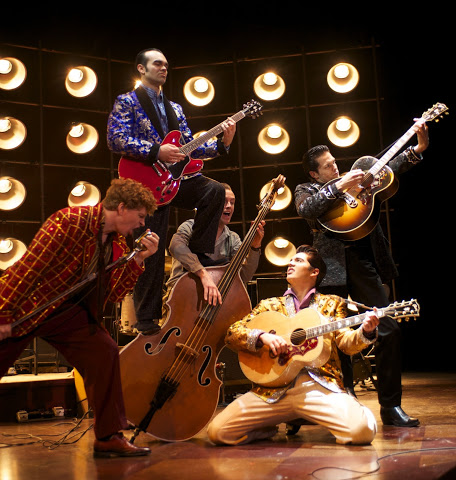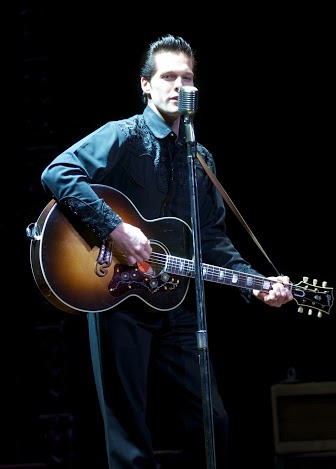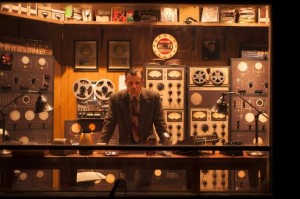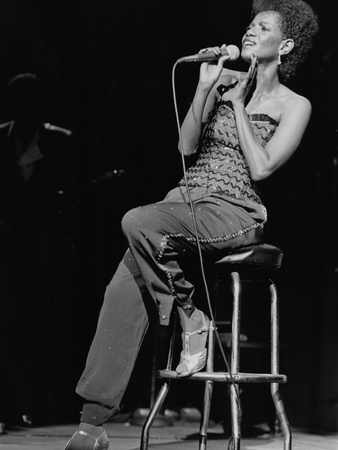A fateful winter day when four of rock and country’s greatest sang together is recreated in MILLION DOLLAR QUARTET, the hit musical which plays the Fox Theatre from March 12-17 as part of the Broadway in Atlanta series. The extraordinary recording session on Dec. 4, 1956, included Elvis Presley, Jerry Lee Lewis, Carl Perkins and Johnny Cash and was presided over by legendary Sun Records owner/producer Sam Phillips. Among the rock hits recorded that night were “Blue Suede Shoes,” “Fever,” “That’s All Right,” “Sixteen Tons,” “Great Balls of Fire,” “Walk the Line,” “Whole Lotta Shakin’ Goin’ On,” “Who Do You Love?,” “Matchbox,” “Folsom Prison Blues,” “Hound Dog” and more.
The family of Johnny Cash, in a twist of fate and coincidence, moved to Memphis in the early 1950s. One day he worked up his gumption to show up at Sun and ask Sam for a recording contract. Sam wasn’t interested in the gospel songs that were Johnny’s first love and was rumored to suggest he “go home and sin, then come back with a song I can sell.” Johnny says that anecdote didn’t happen, but he did switch to rockabilly, Sam took him on, and he recorded early hits such as “Hey Porter,” “Folsom Prison Blues” and ‘Walk the Line” at Sun. He actually became Sun’s best selling artist and the first to complete an LP.
To find out more about MILLION DOLLAR QUARTET and Johnny Cash’s Sun years, we caught up with David Elkins, who plays Johnny in the national tour company.
How did you get the part of Johnny Cash?
I answered an open call audition inNew York City. Yes, I was going in solely for the role of Johnny. I couldn’t begin to do those other guys justice. But I knew what I sounded like when I sang, and I just thought, “I can do that.” I love Johnny and his story. I respect his life’s journey and what he stood for, so it’s a real honor to try and bring a glimpse of that, one slice of time in his life, and share that with people everyday.
Some people may be less familiar with Johnny Cash’s relationship with Sun Records than with Elvis Presley, Jerry Lee Lewis and Carl Perkins. What will audiences learn about him in MILLION DOLLAR QUARTET that they may not know?
Johnny Cash was there at Sun, but he left for Columbia Records, which is one of the dramatic story points in the show. He wanted to record a gospel album, and Mr. Phillips didn’t want to record it. He didn’t think the kids would buy it, but Columbia said they would record it. It’s true that when most people think of Johnny, it’s more the “Man in Black” Johnny Cash of the ‘60s and ‘70s, and later AMERICAN RECORDINGS even, with [producer] Rick Rubin. That’s maybe why the Sun Records years don’t stick out as much today to some.
How did you approach playing Johnny Cash?
Instead of tackling the icon and trying to bring all that to the stage in less than two hours, I approached him as a 24-year-old kid from Arkansas who grew up picking cotton. My grandmother grew up 200 miles north of where Johnny was born [in Kingsland], so I heard all sorts of stories about picking cotton, working in the fields, and looking out for rattlesnakes. I thought of those folks who I have met. It made [Johnny’s early life] immediately tangible for me.
What are your favorite songs in the musical?
I really like our Quartet numbers. We do “Down By the Riverside” and “Peace in My Valley.” Those are pretty magical moments when we get to harmonize. And personally I love watching the other guys do their thing. I get to be on stage and watch them. Everybody I work with is so talented. I really love doing “Walk the Line,” too. People really open up to it. The first song I do is “Folsom Prison Blues,” and that song always gets a great reaction. After one show, I talked to a navy midshipman who used to listen to Johnny Cash all the time. He said, while I was singing, he closed his eyes and thought of his friends. I thought that was very genuine and from the heart. Things like that are very special.
I did a show in Durham, NC, and Johnny Cash’s nephew and his family met me after the show. He said that someone had told him he should go see the show. He said he figured that the other guys will be pretty good, but “nobody sounds like my uncle Johnny…but you nailed it.” That was such a blessing to me and a real confirmation of what we are trying to do.
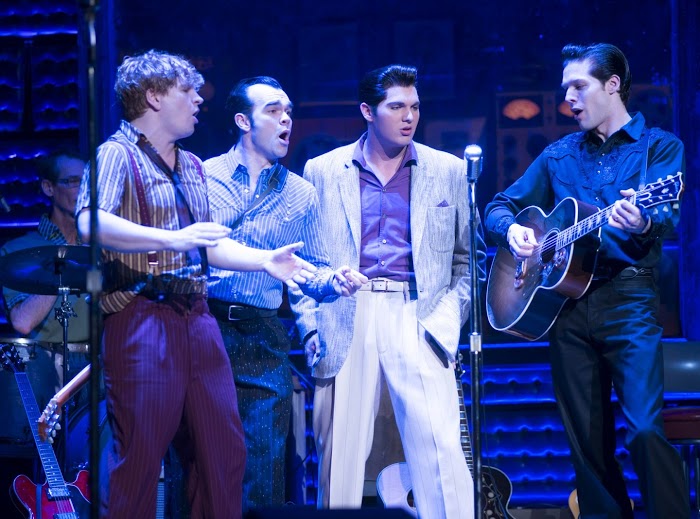
Ben Goddard as Jerry Lee Lewis, James Barry as Carl Perkins, Cody Slaughter as Elvis Presley and David Elkins as Johnny Cash in The National Tour of MILLION DOLLAR QUARTET (Photo by Paul Natkin)
Do you have any ritual for getting in character?
My warm-up consists of singing along to the HYMNS BY JOHNNY CASH album that he recorded shortly after he left Sun. I also watched old videos of his appearances on TV shows such as TOWN HALL PARTY and THE TEX RITTER SHOW and other clips of that era. It is not an impersonation, but I try to channel the feel of those shows. I think about what makes Johnny such a dynamic performer, so earnest and direct with his delivery. He really made each song his own. He was a storyteller. When he covered other people’s songs, he attached an earnestness, just a storyteller’s sensibility to every song. And there’s always that danger, that unpredictability under the surface that I think people are drawn to.
What will audiences be most surprised by?
I think audiences will be surprised by the undeniable impact this one man, Sam Phillips, had on the birth of rock n roll. He really had a gift for pulling new sounds out of young artists, and he recognized the racial barriers in music and helped to knock those down. He’s one of the few people in the Rock and Roll Hall of Fame that wasn’t a musician. The show really is an ode to Sam Phillips. He really anchors the whole story. The script [by Colin Escott and Floyd Mutrux] was based on GOOD ROCKIN’ TONIGHT: SUN RECORDS AND THE BIRTH OF ROCK N ROLL by Colin Escott and Martin Hawkins. You can really feel the respect and love the authors have for Sam. It’s interesting to listen to the music of that time. If you listen to what they would have heard on the radio, then you can better understand why what they did at Sun was so revolutionary.
In MILLION DOLLAR QUARTET, you’ve had the pleasure of performing in a lot of vintage theaters before getting to our Fabulous Fox. Any favorites?
A great part of the tour has been seeing beautiful old theaters. One of the cast members, Katie Barton, who is the understudy for Elvis’s girlfriend Dyanne, is from Atlanta and she told me the Fox is beautiful. There was Proctors Theatre in Schenectady, NY, where Duke Ellington performed and KING KONG played. I liked the Forrest Theatre in Philadelphia. It wasn’t the most beautiful and the boards were a bit creaky, but it takes you back in time a bit and it felt great to be right in the middle of the city. The [former] Hippodrome [ now the France-Merrick Performing Arts Center] in Baltimore was also very impressive and a lot of fun to play in.

